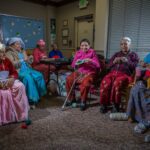Many refugees will face unique socio-emotional stressors before, during, and after resettling in their new home country. The program presented herein focuses on the use of para-professionals, peer educators, from within refugee communities to build upon the Center for Torture and Trauma Survivors Clubhouse model. Group leaders seek to provide supports that will: 1) decrease feelings of isolation; 2) build community networks and; 3) increase feelings of empowerment within the community. To accurately represent the fluidity of the refugee population in this metropolitan region, background is presented on an established refugee population from Iraq and a more recent influx of refugees of Bhutan (ethnic Nepali). The juxtaposition of the two groups underscores the importance of presenting a dynamic program that is peer-led to provide the supports necessary to acclimate to their new environment. Program evaluation results from groups run in 2016-2017 indicate that the groups have been successful in helping participants make friends, get information, become more independent, and feel better about life in America. Additionally, participants report a significantly higher number of individuals who they can “talk to about problems or worries” and connect to with a sense of trust within their ethnic community. Finally, the utility of other therapeutic and support processes, such as horticultural and expressive arts therapies, are discussed apropos work with refugee populations.
Diversity initiatives in the US workplace: A brief history, their intended and unintended consequences
Diversity initiatives are designed to help workers from disadvantaged backgrounds achieve equitable opportunities and outcomes in organizations. However, these programs are often ineffective. To better

